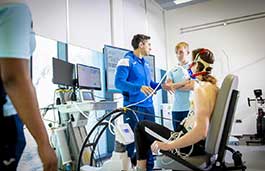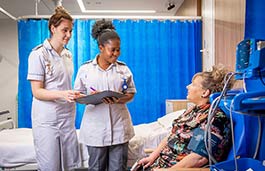Search
Physiotherapy BSc (Hons)
Study level: UndergraduateProfessionally Accredited Programmes

Physiotherapists play a vital role in enabling people to maximise their health, wellbeing and quality of life through movement, exercise, manual therapy and education.
Course features
Year of entry
Location
Coventry University (Coventry)
Study mode
Full-time
Duration
3 years full-time
Course code
B160
Start date
September 2025
We are reviewing many of our School of Health and Care courses for 2025-26 entry to transform the teaching and learning. We are currently showing our 2024-25 course information, please keep checking back on this page to see our latest updates.
Course overview
Our course will result in you being able to register with the Health and Care Professions Council and enter this exciting professional career as a qualified Chartered physiotherapist.
- Accredited1 by the Health and Care Professions Council (HCPC) and Chartered Society of Physiotherapists (CSP).
- All eligible home students on this course can apply for a minimum payment from the Government of £5,000 per year, with additional payments for students incurring childcare costs6.
- State-of-the-art teaching facilities including mock wards with interactive manikins, operating theatre, community houses, sport and exercise environments4.
Joint Top Modern University for Career Prospects
Guardian University Guide 2021 and 20225 QS Stars for Teaching and Facilities
QS Stars University RatingsTop 5 UK Student City (Coventry)
QS Best Student Cities Index 2023Why you should study this course
Our Physiotherapy BSc (Hons) course is designed to provide you with the skills, knowledge and experience required to be a safe, effective physiotherapist that will not only make a difference to individuals throughout their life but also to wider society in a variety of healthcare contexts.
The physiotherapy programme allows you to develop problem-solving skills, enterprise and resourcefulness to respond to the dynamic healthcare environment. Your learning experience will support you to adopt the professional values and behaviours expected of a physiotherapist - working respectfully within a multidisciplinary team, providing healthcare underpinned by current evidence and placing the clients in the centre of the therapeutic process.
As a professionally accredited course, it is designed to prepare you academically, professionally and personally for a successful career as a chartered physiotherapist. You will develop a wide range of practical and academic skills in contemporary physiotherapy with multiple opportunities to develop your clinical skills through practice-based learning – a total of 1,120 hours completed over the course of five clinical placements5 – in which you will participate in physiotherapy practice under the supervision of a fully qualified, experienced physiotherapist. This is well in excess of the minimum hours required by the CSP.
The course not only provides you with an academic qualification but also a professional status, as the course is accredited by the Chartered Society of Physiotherapy (CSP) and enables you to apply for registration with the Health and Care Professions Council (HCPC) (additional costs may apply).
A distinctive feature of our course is that your skills development and essential learning takes place in your first year prior to clinical placement. This foundational learning occurs in our state-of-the-art Alison Gingell Building, allowing the use of authentic simulation experiences to put your learning into context in a supportive environment prior to your first placement. We are regularly informed that clinicians enjoy having Coventry students because they are so well-prepared for placement and can optimise the experience.
The multi-million-pound Alison Gingell Building provides facilities for teaching and research, featuring hospital simulation, interactive manakins, community houses, rehabilitation, clinical skills training, sport and exercise environments.
You’ll be taught by a team of enthusiastic, research-active staff who place great emphasis on your individual development, equipping you with the theoretical, practical, analytical, interpersonal and research skills required for effective clinical reasoning (staff may be subject to change). You will have the opportunity to develop the confidence to make informed, competent treatment decisions, initially during placement and subsequently as you move forward into your physiotherapy career.
You’ll have the opportunity to attend guest lectures led by experts in their fields and employers in large NHS trusts, private practice, industry and sport (subject to availability). Previous speakers have included the Head of Sports Medicine at WBA FC, and Karen Middleton, Chief Executive of the CSP.
It is acknowledged that working as an allied health professional requires emotional intelligence, resilience and a dedication to lifelong learning. Throughout the course you will be supported in your personal and professional development in order to meet these demands. This will allow you to develop strategies to protect your own personal health and wellbeing as well as identify opportunities to flourish in your career.
Accreditation and professional recognition
This course is accredited1 and recognised by the following bodies:
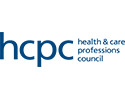
Health and Care Professions Council
This course is currently approved by and is registered with the Health and Care Professions Council, which conveys a licence allowing you to use the title of physiotherapist and to practise physiotherapy in the UK following successful completion of the course. This course is accredited by the HCPC for the 2024/25 intake.
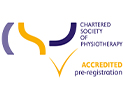
Chartered Society of Physiotherapy (CSP)
This course is accredited by the Chartered Society of Physiotherapy (CSP) for the 2024/25 intake, allowing you to apply for membership with the CSP on successful completion of the course (additional costs apply).
Studying physiotherapy at Coventry happens to be one of the best decisions I have made. The modules are in-depth. Even though it can be challenging sometimes, the lecturers are always helpful and readily available with fantastic communication and support. It has been a brilliant experience being on the course as it has help me develop mentally, psychologically and academically.
Anie Asuquo, first year student, 2021
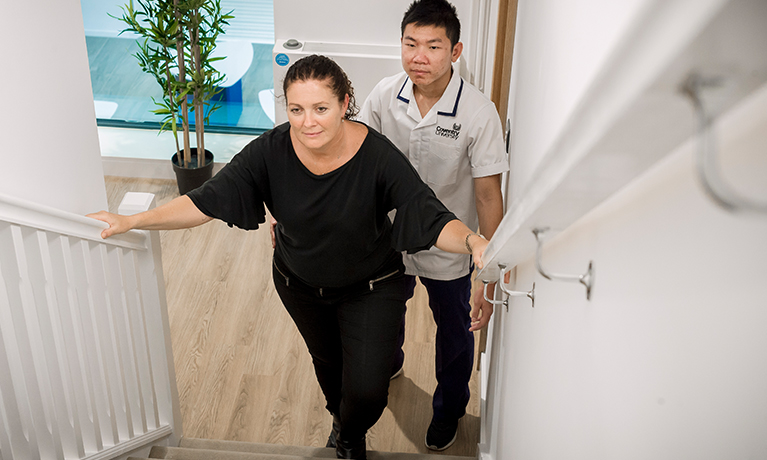
What you'll study
We regularly review our course content, to make it relevant and current for the benefit of our students. For these reasons, course modules may be updated.
How you'll learn
The teaching and learning approaches used within the course allow you to develop a wide range of practical and academic skills required to meet the expanding role and diverse career pathways of physiotherapists within the contemporary healthcare setting.
Teaching approaches used, such as problem-based learning and flipped classroom, allow you to develop as an independent lifelong learner and explore theory in your own time. You will be fully supported in these new ways of learning through the use of comprehensive study guides and resource lists. Theory will be applied and practical skills will be developed during seminars and practical workshops in groups of around 20 students.
We recognise the importance of peer support and learning from each other for academic, personal and professional development and so have developed a “buddy system”.
As an innovative and enterprising institution, the course follows a blended learning approach using emerging technologies within the student experience. Like all courses, we deliver certain contact hours and assessments via online technologies and methods. You will be supported in your learning online through scaffolded self-directed learning which will then be applied during your face-to-face sessions. These sessions will be either seminars, tutorials or practical workshops where you will be supported to consolidate your understanding, apply knowledge and learn new skills.
Teaching contact hours
During your first year of study, you will have between 10 and 20 contact hours of teaching per week. The majority of this will be either seminars or practical workshops. The number of contact hours will reduce in subsequent years as you become a more competent independent learner and focus on individual projects. When on placement you will carry out 40 hours of practice-based learning per week.
Additionally, you will be expected to undertake approximately 15-20 hours of self-directed study each week depending on the module you are studying. As you progress through the course there will be an increased expectation for self-directed study as you have developed independent learning skills. The contact hours may be made up of a combination of face-to-face teaching, individual and group tutorials, and online classes and tutorials.
As an innovative and enterprising institution, the university may seek to utilise emerging technologies within the student experience. For all courses (whether on-campus, blended, or distance learning), the university may deliver certain contact hours and assessments via online technologies and methods.
Since COVID-19, we have delivered our courses in a variety of forms, in line with public authority guidance, decisions, or orders and we will continue to adapt our delivery as appropriate. Whether on campus or online, our key priority is staff and student safety.
Assessment
This course is assessed using a variety of methods which will vary depending upon the module. This is to ensure that our assessments are authentic and reflect the challenges faced in the clinical context and allow you to demonstrate our creativity and digital fluency.
Assessment methods include:
- Exams
- Video production
- Practical assessments
- Group work
- Reports
The Coventry University Group assessment strategy ensures our courses are fairly assessed and allows us to monitor student progression towards achieving the intended learning outcomes.
International experience opportunities
Our course provides international learning experiences to help prepare you for the global employment market as well as strengthen and develop your broader intercultural, personal and professional skills2.
The facilities available for physiotherapy students at the Alison Gingell Building at Coventry University are exceptional. They have been an incredible asset to aid learning on the course and the simulation ward that includes patient simulation manikins are great for practicing valuable assessment skills that are essential to placement.
Albert Ashley, second year student, 2021
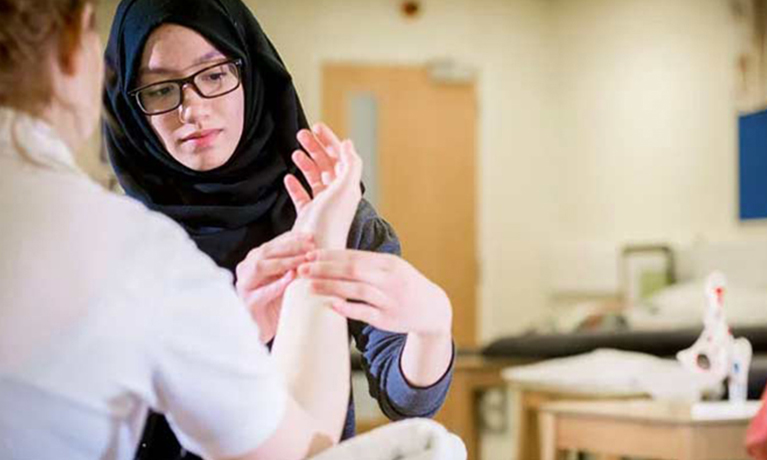
Entry requirements
Typical offer for 2024/25 entry.
Fees and funding
2024/25 tuition fees.
| Student | Full-time | Part-time |
|---|---|---|
| UK, Ireland*, Channel Islands or Isle of Man | 2025/26 fees TBC 2024/25 fees - £9,250 per year |
Not available |
| EU | 2025/26 fees TBC 2024/25 fees - £9,250 per year with EU Support Bursary** 2025/26 fees TBC 2024/25 fees - £19,850 per year without EU Support Bursary** |
Not available |
| International | 2025/26 fees TBC 2024/25 fees - £19,850 per year |
Not available |
If you choose to do a work placement2, you should consider travel and living costs to cover this. There is also a tuition fee3 of £1,250 that will cover your academic support throughout your placement year.
For advice and guidance on tuition fees and student loans visit our Undergraduate Finance page and see the university’s Tuition Fee and Refund Terms and Conditions.
We offer a range of International scholarships to students all over the world. For more information, visit our International Scholarships page.
Tuition fees cover the cost of your teaching, assessments, facilities and support services. There may be additional costs not covered by this fee such as accommodation and living costs, recommended reading books, stationery, printing and re-assessments should you need them. Find out what's included in your tuition costs.
*Irish student fees
The rights of Irish residents to study in the UK are preserved under the Common Travel Area arrangement. If you are an Irish student and meet the residency criteria, you can study in England, pay the same level of tuition fees as English students and utilise the Tuition Fee Loan.
**EU Support Bursary
Following the UK's exit from the European Union, we are offering financial support to all eligible EU students who wish to study an undergraduate or a postgraduate degree with us full-time. This bursary will be used to offset the cost of your tuition fees to bring them in line with that of UK students. Students studying a degree with a foundation year with us are not eligible for the bursary.
Facilities
Our multi-million-pound Alison Gingell Building features a range of mock healthcare settings, including hospital wards, ambulance, therapy suites and community houses, giving you the opportunity to replicate real-life situations before you go on placement.
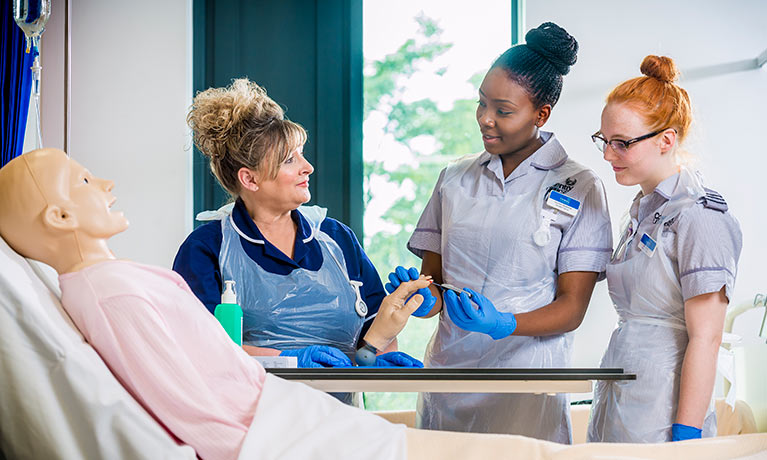
Hospital Wards
We have two fully-equipped mock hospital wards, each containing 4 beds. The wards are built to NHS standards and contain moveable beds, first aid equipment and patient monitoring tools. You will have the opportunity to engage in high-fidelity simulation giving you the opportunity to practice your physiotherapy skills on a critically unwell patient.
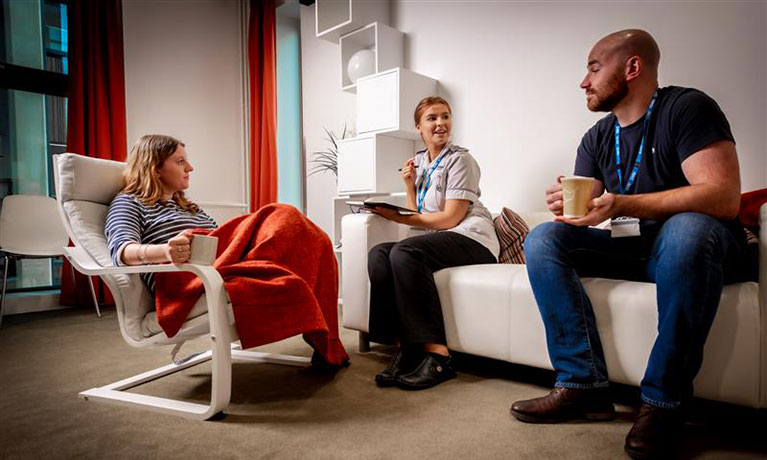
Community Houses
There are two fully furnished houses within the Alison Gingell building. This environment allows you to consider how your physiotherapy skills could be applied in the community setting.
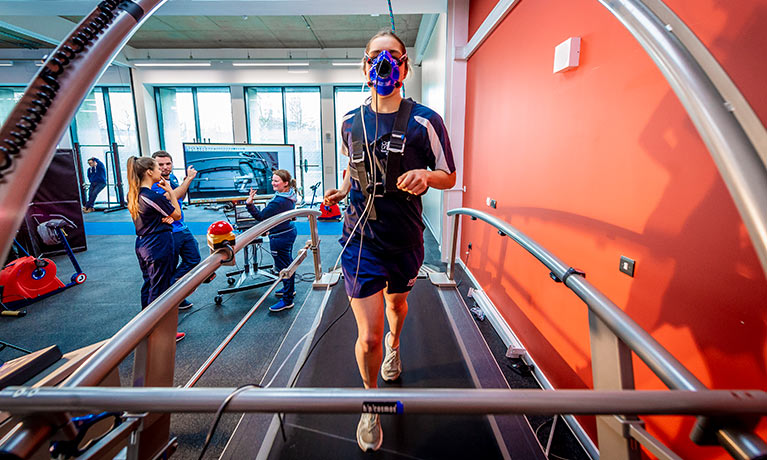
Strength and Conditioning Suite
Our multi-purpose suite is equipped with multiple Olympic lifting platforms, a 20m gait analysis track, an anti-gravity treadmill and even a 3D motion capture system. You will have the opportunity to develop your skills in the sports context.
Careers and opportunities
Our course is designed to prepare you personally and professionally for a successful career as a chartered physiotherapist. You will have the opportunity to develop a wide range of practical and academic skills which you will put into practice on five clinical placements.
The final year modules facilitate your preparation for entry into the physiotherapy profession. A dedicated module exploring employability, enterprise and entrepreneurism will help to equip you with the skills to secure your first job and flourish professionally within public, private or third sector organisations.
An annual physiotherapy Employability Fair, which coincides with a final year poster conference assessment, allows you to explore the career opportunities and in some cases apply and be interviewed there and then (subject to availability).
Your “buddies” will also provide individual advice on your future career decisions and offer support throughout the process of securing your first position.
A degree in physiotherapy offers the opportunity for a challenging, rewarding and well-respected career.
There is a huge demand and excellent employment prospects for our newly qualified physiotherapists. Our courses are developed collaboratively with our practice partners to ensure that we produce graduates with the knowledge and practical skills desired by potential employers.
On graduation, you will be eligible to apply for registration with the Health and Care Professions Council allowing you to work as a physiotherapist in the UK (additional costs apply). If you wish to progress your studies further, for example on a Physiotherapy or Health Studies master’s course, you will be eligible to apply.
Coventry University and the physiotherapy course team is committed to preparing you for your future career and giving you a competitive edge in the graduate job market. Throughout the course you will be required to record learning experiences in an e-portfolio which provides a foundation for a professional lifelong learning commitment, fulfilling the requirements of the Health and Care Professions Council, which enhances employability.
Where our graduates work
The expanding role of the physiotherapist within both the public and private sectors may offer many career pathways within the NHS, industry, community settings, sports and the private, independent and voluntary sectors. Our multiple placement opportunities throughout the course reflects these diverse prospects. Your qualification may also allow you to apply for overseas accreditation to work abroad (acceptance of HCPC accreditation to practice overseas is determined by the individual countries and may change over time).
If you wish to progress your studies further, for example on a Physiotherapy or Health Studies master’s course, you will be eligible to apply.
Graduate Immigration Route visa
Based on current information from the UK Government, international students whose study extends beyond summer 2021 may be eligible for a visa under the UK Government’s Graduate Immigration Route, which will enable students to stay and work, or look for work, in the UK at any skill level for up to two (2) years. Check the most up to date guidance available to check your eligibility and any updates from the UK Government before making an application or enrolment decision.
How to apply
You may also like
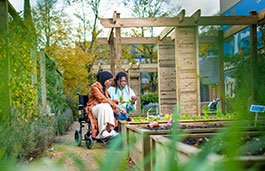
Occupational Therapy BSc (Hons)
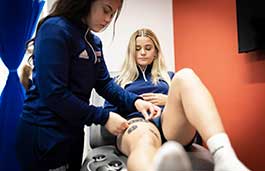
Sports and Exercise Therapy BSc (Hons)
